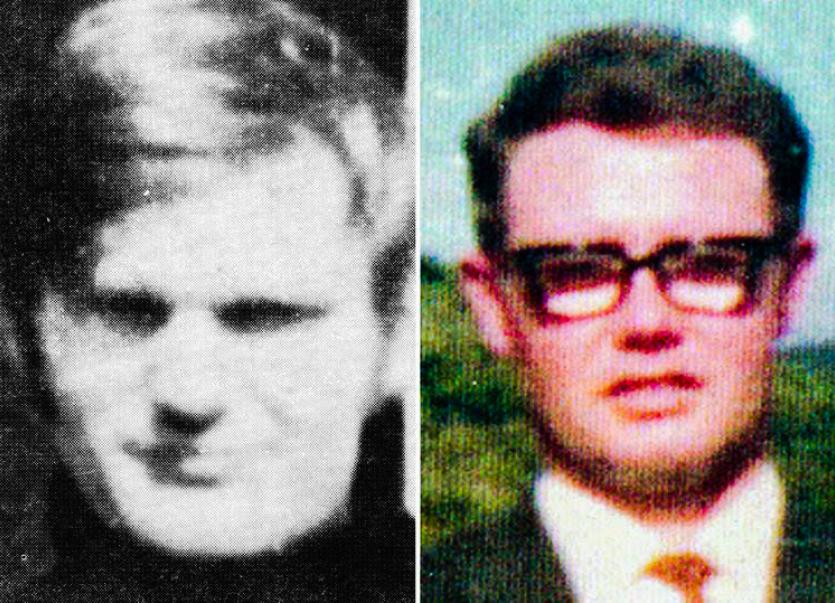
James Wray and William McKinney who died on Bloody Sunday
A High Court judge has said the arguments for and against Soldier F’s anonymity should be heard in open court in the interests of transparent justice.
Some of the relatives of those killed and injured on Bloody Sunday viewed High Court proceedings remotely from the Rath Mor centre in Creggan on Tuesday, March 23.
Soldier F is charged with murdering Jim Wray and William McKinney on January 30, 1972.
He’s also charged with attempting to murder Patrick O’Donnell, Joseph Friel, Joe Mahon and Michael Quinn, as well as attempting to murder a number of persons unknown.
His Committal hearing is ongoing at Derry Magistrate’s Court.
Represented by Madden and Finucane Solicitors, Margaret Wray – a sister of Jim Wray – is challenging a decision to grant soldier F anonymity and screening during Committal proceedings at Derry Magistrate’s Court.
At the start of those proceedings, Judge Ted Magill decided to extend an interim anonymity order first made on September 18, 2019.
Ms Fiona Doherty QC, representing the applicant Margaret Wray, disputed the decision to uphold the anonymity order saying that no proper formal application or evidence was submitted.
She added that no formal application for screening has been advanced by Soldier F, who gave evidence unscreened from the public over two days at the Saville Inquiry in October 2003 and before Widgery in 1972.
Ms Doherty said: “In our view, neither of these measures are justified and are unacceptable breaches of the principals of open justice.”
Representing the NI Court Service Mr Paul McLaughlin QC said that Judge Magill wanted to deal with the issue of ‘standing’ first – that is whether the families have standing to get involved in the proceedings or whether it should be a matter between the crown and the defendant.
Ms Doherty disagreed with that approach saying the issue of ‘standing’ is a ‘red herring’ as the judge ‘has to get on with anonymity as well’.
She added: “He needs to have an application from the defendant, we are confused about what is happening.
“You will appreciate that these are very important and painful proceedings for the families.
“They have encountered a number of difficulties and that hasn’t made this easy for them.”
Ms Doherty submitted that if the District Judge and PPS had ‘handled’ it correctly there would be no need for the High Court challenge.
She said anonymity only seems to be granted for soldiers who are ‘charged with serious legacy cases’.
“I don’t know why that is happening. I don’t know why they are treated differently to other defendants. I don’t know why the court is allowing it,” she added.
Ms Doherty asked the court to ‘guarantee that it will be dealt with properly’.
Mr Paul McLaughlin QC said that District Judge Magill assumed responsibility for the case after an interim anonymity order had been granted.
“The issue for him was continuing it rather than granting it.”
Presiding High Court Judge, Mr Justice Colton said that decision was made ‘without any opposition’ from the Public Prosecution Service (PPS).
Mr McLaughlin argued that Judge Magill came to the case when the train was set in motion and if he overturned the interim order it could be viewed as ‘prejudicing his decision’.
He told the court that during Saville and Widgery inquiries soldier F had the ‘benefit’ of anonymity publicly.
The barrister added that once the issue of ‘standing’ is determined, directions will be given in April regarding the anonymity order; before the second phase of Committal proceedings begins.
Mr Justice Colton said he was keen to do justice to all the parties involved.
He held that an application ‘must be made’ by the defendant and ‘should be made at the earliest opportunity’.
An anonymity application should be heard at the outset, he said, and ‘should be based on clear and cogent evidence’ which is ‘properly and carefully scrutinised’ by the District Judge.
“The arguments for and against should be heard in open court,” he added, “and the media should be given a chance to intervene.
“That hasn’t happened in this case.”
The court was told that the Bloody Sunday families are pressing the issue of anonymity and were ‘given clear direction that it would be dealt with at the start of the trial’.
Addressing the issue of screening, he said Judge Magill believed it would undermine the anonymity order because current remote hearings mean the court ‘has no control over photos that might be taken’.
In Mr Justice Colton’s view screening is ‘another derogation that will have to be justified’.
He suggested the way forward is to imminently put a process in place to determine the matter as ‘the last thing anybody wants is for Committal proceedings to stop’.
He also requested ‘specific timetabling’ to deal with the issues raised ‘as early as possible’.
“Any derogation from the principle of open justice has to be dealt with. It should be done in open court.
“The focus should be on anonymity rather than standing.”
A ‘more certain way forward’ in accordance with appropriate and established procedure has to be found, he concluded.
The first phase of Committal proceedings are scheduled to conclude this week.
Mr Justice Colton adjourned the High Court challenge for mention at a court sitting on Monday, March 29.
You must be logged in to post a comment.